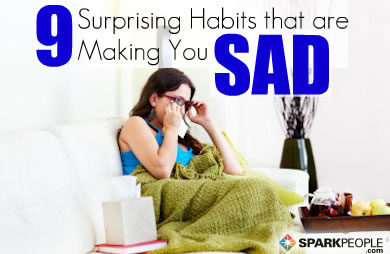|
Think the solution to your fatigue is an earlier bedtime? Getting enough sleep is important, but it’s also the quality that counts—and there’s more to it than just a comfy bed. Also complicating things: As you get older, your sleep patterns change, making it harder to fall (and stay) asleep. But that doesn’t mean you’re destined to be sleep-deprived. You can improve your slumber without tacking on hours in bed—and it’s not hard to do. Just turn the page to get started. Every little habit—from what you eat and drink to when you exercise and watch TV—can impact your sleep. Here’s a sample day that shows you what you can do to get the best zzz’s possible. (Adjust it for your wake and sleep times.) 6:30 A.M. - Skip the snooze button. It’s tempting to turn over and squeeze in an extra 10 to 15 minutes of shut-eye when your alarm goes off, but doing that can actually make you more tired. “You spend so much energy going back to sleep and waking up again that you don’t get any additional deep sleep,” says Kathryn Lee, RN, PhD, professor and associate dean for research at the University of California San Francisco School of Nursing. And you’re more likely to wake up groggy. “So you’re using more energy but not sleeping more to make up for it.” 7:30 A.M. - Exercise. Not only does it give you a shot of energy that’ll help you power through the day, but exercising in the morning may also decrease levels of stress hormones, making it easier for your body to wind down and fall asleep faster, says Scott Collier, PhD, director of the Vascular Biology and Autonomic Studies Laboratory at Appalachian State University. In a recent study led by Dr. Collier, people who got 30 minutes of moderate exercise at 7 a.m. (compared with 1 p.m. and 7 p.m.) significantly improved the quality of their sleep that night, spending 75% more time in deep sleep. 11:00 A.M. - Take a breathing break. “If you don’t take time to stop during the day, falling asleep is harder. Why? When you finally try, you lie awake thinking about all of the things you haven’t had a moment to ponder,” says Diane Renz, LPC, a psychotherapist in Boulder, Colorado. It’s kind of like slamming on the brakes of a fast-moving car and all of the junk in the back flying forward. So once or twice a day, close your eyes and take three slow, deep breaths. 1-2 P.M. - Cut out caffeine. “Caffeine is a stimulant that lasts in your system for 4 to 7 hours,” says Lawrence Epstein, MD, chief medical officer of the Sleep HealthCenters, an instructor at Harvard Medical School and past president of the American Academy of Sleep Medicine. Make sure that by the time you’re going to bed, the stimulating effects have worn off. Coffee isn’t the only culprit: Tea, chocolate and soft drinks also contain levels that can affect your sleep. (Check out exactly how much in “Caffeine Count,” below.)Click here to get more tips on what you can do the rest of the day to sleep better tonight! Stories you might like: Do you follow any of these tips to sleep better? Do you have any other tips to add? Provided Photo |
|














